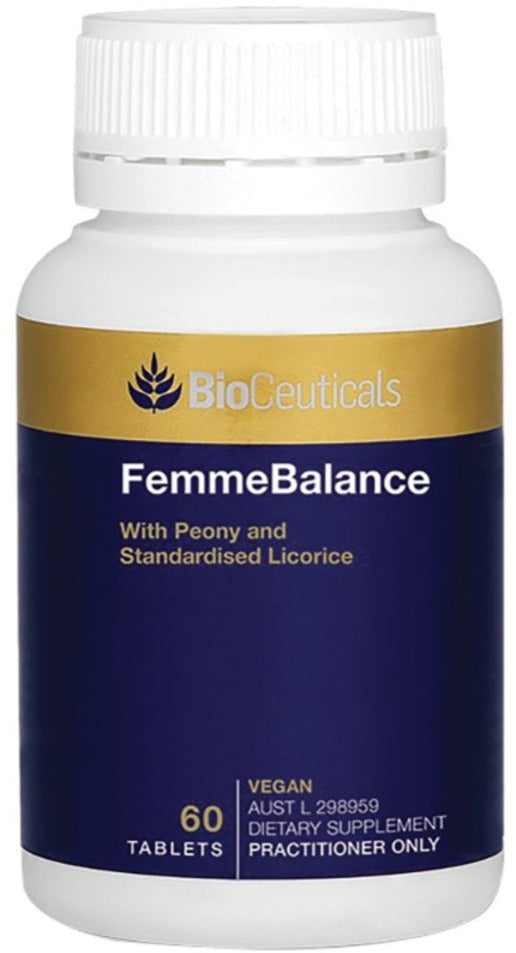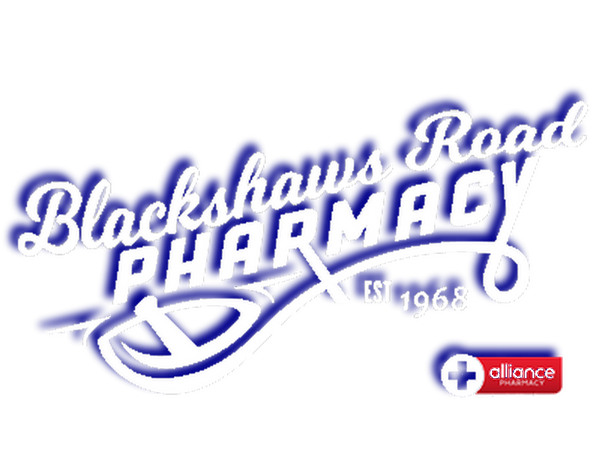BioCeuticals
BioCeuticals FemmeBalance 60 tablets
BioCeuticals FemmeBalance 60 tablets
Couldn't load pickup availability
BioCeuticals FemmeBalance 60 tablets
With Peony and Standardised Licorice
Sizes: 60 tablets
BioCeuticals FemmeBalance Summary:
- BioCeuticals FemmeBalance combines herbal extracts with important nutrients to help support healthy menstruation and provide relief from the symptoms of premenstrual syndrome (PMS).
BioCeuticals FemmeBalance has No Added Dairy, No Added Gluten, No Added Shellfish, No Added Soy Protein
BioCeuticals FemmeBalance is Vegan Friendly, Vegetarian Friendly
BioCeuticals FemmeBalance AUST L 298959
Dose
Dose: BioCeuticals FemmeBalance
Adults: Take 1 tablet twice daily or as directed by your healthcare practitioner.
Features
Features: BioCeuticals FemmeBalance
- BioCeuticals FemmeBalance is a combination of herbal extracts including peony and cinnamon traditionally used in Chinese medicine (TCM) and western herbal medicine (WHM) respectively to assist in menstrual irregularities.
- BioCeuticals FemmeBalance has peony and standardised licorice which have been shown to help modulate testosterone levels when used in combination.
- In WHM, dandelion aids the body’s natural channels of elimination via its diuretic activities.
- BioCeuticals FemmeBalance has cinnamon which has been used traditionally in WHM to help relieve heavy menstruation.
- BioCeuticals FemmeBalance has vitamin B6 which provides relief from the symptoms of premenstrual syndrome (PMS) such as breast tenderness, fluid retention and mood changes.
- BioCeuticals FemmeBalance includes myo-inositol stereoisomer of inositol.
Ingredients
Ingredients: BioCeuticals FemmeBalance
| Each BioCeuticals FemmeBalance tablet contains: | |
| Herbal extracts standardised equiv. to dry: | |
| Glycyrrhiza glabra (licorice) root | 2.5g |
| equiv. to glycyrrhizinic acid | 28.5mg |
| Herbal extracts equiv. to dry: | |
| Paeonia lactiflora (peony) root | 2g |
| Cinnamomum cassia (cinnamon) stem bark | 1g |
| Taraxacum officinale (dandelion) leaf | 750mg |
| Vitamins: | |
| Pyridoxine hydrochloride | 91.1mg |
| equiv. to pyridoxine (vitamin B6) | 75mg |
| Pyridoxal-5-phosphate monohydrate (P5P) (active vitamin B6) | 39.1mg |
| equiv. to pyridoxine | 25mg |
| Nutrients: | |
| Inositol (myo-inositol) | 200mg |
Ingredient Summary
Ingredient Summary: BioCeuticals FemmeBalance
Glycyrrhiza glabra (licorice)
Glycyrrhizic acid, also known as glycyrrhizinic acid, is an active component of licorice. In vivo, it is completely hydrolysed into glycyrrhetinic acid (GA) which is responsible for the majority of the plant’s pharmaceutical actions.[1] In laboratory studies, GA has been shown to inhibit the conversion of androstenedione into testosterone and stimulate the aromatisation of testosterone to oestradiol. These actions help to reduce endogenous testosterone levels.[1]
Peonia lactiflora (peony)
Peony is traditionally used in Chinese medicine (TCM) for dysmennorhoea.[2] In vitro evidence has shown that paeoniflorin affects ovarian follicles through its action on aromatase enzyme.[3] Laboratory evidence has demonstrated that peony elicits an antispasmodic effect on the ileum and uterus.[4]
Cinnamomum cassia (cinnamon)
Cinnamon is used to help relieve heavy menstruation in traditional WHM. It naturally contains essential oils that possess anti-inflammatory activity as demonstrated in vitro through the inhibition of cyclooxygenase activity and prostaglandin production.[5] Cinnamon extracts have also been found to increase insulin sensitivity in vitro by activating key enzymes that stimulate insulin receptors.[6]
Taraxacum officinale (dandelion)
Dandelion leaf has been used traditionally in WHM for its diuretic activity to support the body’s natural channels of elimination.[6] It is inherently high in potassium, which is not leached from the body via its activities; unlike some other diuretics.[7]
Vitamin B6
Vitamin B6 aids in the formation of several neurotransmitters such as serotonin, melatonin and dopamine.[8-10] It is a cofactor for the enzyme 5-hydroxytryptophan decarboxylase, which is integral for the conversion of tryptophan to serotonin.[6] It may help to relieve breast tenderness, fluid retention, mood changes, irritability and fatigue associated with premenstrual syndrome.[11]
Inositol (myo-inositol)
Myo-inositol is one of the two main stereoisomers of inositol, present in the body. Myo-inositol is the precursor to inositol triphosphate; a messenger that regulates endocrine and reproductive hormones such as TSH, FSH and insulin.[12]
Warnings
Warnings: BioCeuticals FemmeBalance
- Stop taking this medication if you experience tingling, burning or numbness and see your healthcare practitioner as soon as possible.
- If you have any pre-existing conditions, are on any medications, always talk to your health professional before use.
- Some products should be ceased at least two weeks before any elective surgery, please confirm with your health professional.
- Always read the label, use only as directed and if symptoms persist consult your healthcare practitioner.
- Vitamin supplements should not replace a balanced diet.
Companion Products
Companion Products: BioCeuticals FemmeBalance
- BioCeuticals FemiPain
- BioCeuticals UltraClean 85
- BioCeuticals Ultra Miscle Wze P5P
- BioCeuticals Women's Essentials
References
References: BioCeuticals FemmeBalance
- Mattarello MJ, Benedini S, Fiore C, et al. Effect of licorice on PTH levels in healthy women. Steroids 2006;71(5):403-408.
- Bensky D, Clavey S, Stögen E. Chinese herbal medicine materia medica, 3rd ed. Seattle: Eastland Press, 2004.
- Ota H, Fukishima M. Stimulation by Kanpo prescriptions of aromatase activity in rat follicle cell cultures (pp.177-183). Recent advances in the pharmacology of Kanpo (Japanese herbal) medicines. eds E. Hosoya and Y. Yamamura. Excerpta Medica; Amsterdamn, 1988.
- World Health Organisation (WHO). Radix paeoniae. Monographs on selected medicinal plants, vol. 1. Geneva: WHO, 1999.
- European scientific cooperative on phytotherapy (ESCOP). ESCOP Monographs, 2nd ed. Stuttgart: ESCOP Thieme, 2003.
- Braun L, Cohen M. Herbs and natural supplements: an evidence-based guide, 3rd ed. Syd-ney: Churchill Livingstone Elsevier, 2010.
- Dandelion leaf. Globinmed. Viewed 19 Feb 2018, http://www.globinmed.com/index.php?option=com_content&view=article&id=78137:dandelion-leaf&catid=26
- Shils ME, Shike M (eds). Modern nutrition in health and disease, 10th edition. Lippincott Wil-liams & Wilkins, 2006.
- Stipanuk MA, Caudill MA. Biochemical, physiological and molecular aspects of human nutri-tion, 3rd ed. St Louis: Elsevier Saunders, 2013.
- Gropper SS, Smith JL. Advanced nutrition and human metabolism, 6th ed. Boston: Cengage Learning.
- Pizzorno JE, Murray MT. Textbook of natural medicine. St Louis; Elsevier Churchill Living-stone, 2013.
- Bizzarri M, Carlomagno G. Inositol: history of an effective therapy for polycystic ovarian syndrome. Eur Rev Med Pharmacol Sci 2014;18(13):1896-1903.
- Peony; Licorice; Cinnamon; Dandelion. Natural Medicines comprehensive database 2017. Viewed 19 Feb 2018, wwww.naturaldatabase.com
- Trickey R. Women, hormones and the menstrual cycle. Fairfield: Trickey Enterprises, 2011.
Share


